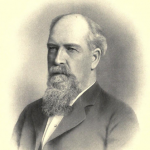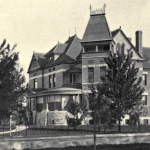
One of the honored pioneers and distinguished citizen of Boise is the well known president of the First National Bank of Idaho, Christopher Wilkinson Moore. To him there has come the attainment of a distinguished position in connection with the great material industries of the state, and his efforts have been so discerningly directed along well defined lines that he seems to have realized at any one point of progress the full measure of his possibilities for accomplishment at that point. A man of distinct and forceful individuality, of broad mentality and most mature judgment, he has left and is leaving his impress upon the industrial world. For years he has been an important factor in the development of the natural resources of the state, in the upbuilding of the capital city and in the promotion of the enterprises which add not alone to his individual prosperity, but also advance the general welfare and prosperity of the city in which he makes his home.
Mr. Moore was born in Toronto, Canada, November 30, 1835, and is of Scotch-Irish descent. His parents, Christopher and Eliza (Crawford) Moore, spent the greater part of their lives in and near Toronto, Canada, where the father engaged in farming and merchandising. They were both members of the Methodist church, and their well spent lives won them the deserved esteem of their fellow men. The father departed this life in his seventieth year, and the mother in the sixty-sixth year of her age. They were the parents of six children, four of whom are now living.
Mr. Moore of this review acquired his education in the schools of Toronto, Canada, and of Wisconsin, and on the 5th of May, 1852, started with his parents and family, in company with a party, for the Pacific coast. He was then only in his seventeenth year. The journey was made across the plains to Oregon with teams, and they experienced many hardships and trials before their destination was reached. They had in their train about three hundred head of cattle and horses, and Mr. Moore was one of the drivers. The stock of advance emigrants had eaten all the grass near the trail at watering places, and taking a buffalo robe with him, he frequently, with one other person, would drive the stock several miles from the trail to a point where they could find feed. There, wrapping themselves in the robes, they would lie down and sleep, while the stock grazed. At daybreak they would peer cautiously from their hiding places, and if there were no Indians in sight, would catch their horses and drive the stock back to camp.
On one occasion they made a drive of forty miles, during which time they had no feed or water, to Snake river, where they found no feed could be secured on that side of the stream, and consequently it became necessary to swim across to where they could see an abundance of good grass. Mr. Moore and another boy undertook this, and after getting the stock in the river they followed on their horses. After a time it became evident that they were making but little headway. His companion and his horse sank in a whirlpool. After a few seconds they came up at different points, and Mr. Moore called to the young man to catch the horse by the tail and let him troll him out. He answered that he could swim out alone, but as he was hampered by his boots and clothing, made little progress and after-ward was engulfed in another whirlpool. Several days later the body was seen on the rocks in Salmon Falls, some distance down the river. A number of years later, when Mr. Moore was one-evening in the company of a number of travelers, at a wayside inn between the Columbia river and Puget Sound, one of them told how his son was drowned in the Snake river while he and another boy were driving stock across Mr. Moore at once said: “I was the other boy!” The old gentleman was greatly affected and asked many questions about his lost son.
On another occasion, only a few days later, Mr. Moore was connected with a typical experience of the pioneer emigrant. A white man was found shot, not far from camp, at the deed of an Indian, it was thought. The murderer was tracked in the sand until finally the footprints led to the river where the sand was wet. There the impressions were those of a man’s boots, with heels on; so it was known that the murderer was a white man and not an Indian. The track was followed until they succeeded in arresting the criminal, who, it seems, in company with the murdered man, had found a stray cow on the Sweetwater river, which the other man insisted on retaining. Several weeks later the murderer, finding this man lying on the sand one day, guarding the stock while grazing, came up to him with the remark, “Now I will get even on you!” He then drew a revolver and shot him in the head. After the arrest of the criminal a jury of six men was chosen from a neutral train, and, the verdict of guilty being rendered, the murderer was blindfolded and shot, and both buried in the same grave!
Such are some of the experiences which attended the early crossing of the great plains. The men who came to found homes in the west had to endure many hardships. There was constant danger of Indian attacks. The efforts of such men as Mr. Moore, however, have wrought a great transformation, and the law-abiding settlements, the flourishing towns and enterprising cities of Idaho form a state which occupies a creditable place in the Union. Rich in natural resources, its future history will be still more creditable than its past, and on its annals will be found the name of Christopher W. Moore as one who aided in its splendid development.

On coming to the west he first engaged in raising, buying and selling live stock, and shipping to Puget Sound and Victoria, British Columbia. His efforts in that direction were at-tended with success, and thus he gained a good start in business life. In 1862 he went to northern Idaho, and the following year came to where Boise now is, with the expectation of remaining only a few months: Inn the city has since been his home, and through the intervening years he has been prominently connected with the growth and development of its business interests. He-was first actively engaged in merchandising, selling goods in Booneville, Ruby City and Silver City. He was the first merchant of Owyhee county. He continued his mercantile operations, with excellent success, until 1867, when, in connection with Messrs. B. M. DuRell, William Roberts and D. W. Ballard, the last named the governor of Idaho, they organized the First National Bank of Idaho, at Boise. Mr. DuRell was the first president and Mr. Moore the first cashier. He is now the only survivor among the gentlemen who organized the institution. He continued to serve as cashier for nine years, or until 1876, after which he was a member of the directorate until 1890, and in that year was elected president, in which capacity he has since served with marked fidelity and ability. Not a little of the success of the bank is due to his progressive efforts, wise policy and sound judgment. The bank is capitalized for one hundred thousand dollars and has rendered dividends to the amount of eight hundred thousand dollars. It was the second national bank organized west of the Rocky Mountains, its predecessor being the First National Bank of Portland, Oregon. It has been a credit to the city and its history has been one of eminent success.
Mr. Moore is a man of resourceful business ability, whose efforts have been by no means confined to one line of endeavor. In various other ways he has promoted the material welfare of Boise. He is president of the Artesian Hot and Cold Water Company, which furnishes hot and cold water to most of the best residences and buildings of the city, obtaining its supplies of hot water from artesian wells two and one-half miles distant. He first introduced hot-water heating into his own home and the system was gradually extended until the business has become an important enterprise of the city. In connection, they also conduct a splendid natatorium, with one exception the largest and finest bathing establishment in the west. He is also one of the directors of the Capital Electric Light & Power Company, who furnish an ample supply of light and power for the needs of the city. Mr. Moore is interested in several other lines of business, and has been largely concerned in farming and stock-raising, but has now turned over that line of business to his sons. He carries forward to successful completion whatever ne undertakes and his labors have been crowned with success.
On the 3d of July, 1865, was celebrated the marriage of Mr. Moore and Miss Catharine Minear, of West Virginia, one of the pioneer members of the Methodist Episcopal church of Boise, and a lady most highly esteemed for her many graces of character. Their union has been blessed with six children, three sons and three daughters, namely: Alice, wife of Dr. H. L. Bettis; Laura B., wife of J. W. Cunningham; Crawford, Anna L., Marion P. and Raymond H. The sons, Crawford and Marion, are now engaged in stock-raising. The family residence is one of the most commodious and beautiful homes in the county, surrounded with large and well-kept grounds which furnish a fitting setting to the palatial dwelling.
Since attaining his majority, Mr. Moore has exercised his right of franchise in support of the men and measures of the Republican party and is a stalwart advocate of its principles. He be-longs to no secret or social organizations save the Pioneer Society of Idaho, of which he is now president. He has been very successful in his business life and as a citizen is regarded as of the highest worth.
